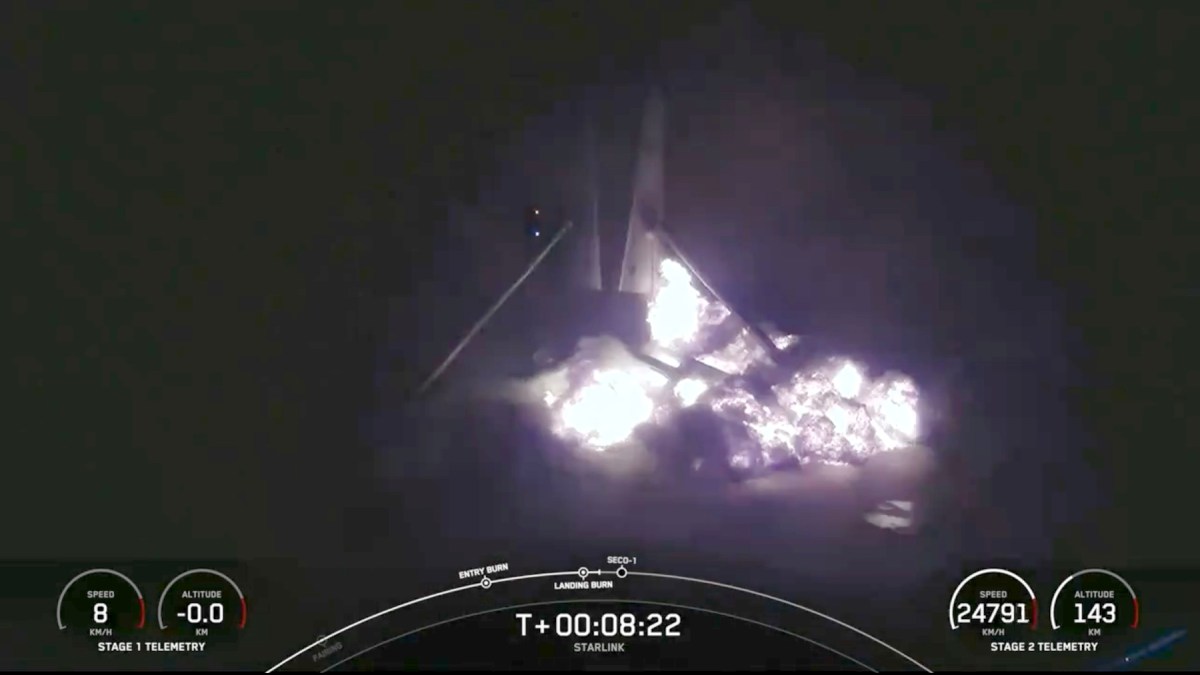WASHINGTON — Falcon 9 launches are temporarily on hold as the Federal Aviation Administration looks into any public safety implications of the failed landing of a booster early Aug. 28.
In an Aug. 28 statement, the FAA stated it was aware of the incident earlier that day when a Falcon 9 booster landed on a droneship on an otherwise successful launch of 21 Starlink satellites. Upon landing, flames erupted from the booster’s base and the vehicle tipped over seconds later.
While the incident caused no injuries or damage beyond the loss of the booster, the FAA noted in its statement that it is requiring an investigation. That will, for the time being, prevent SpaceX from conducting additional launches.
“A return to flight of the Falcon 9 booster rocket is based on the FAA determining that any system, process, or procedure to the anomaly does not affect public safety,” the FAA stated. “In addition, SpaceX may need to request and receive approval from the FAA to modify its license that incorporates any corrective actions and meet all other licensing requirements.”
The investigation need not be complete for SpaceX to resume launches, though. The FAA notes on its website that launch vehicle operators can request a “public safety determination” by the agency if the incident “did not involve safety-critical systems or otherwise jeopardize public safety.” If the FAA does make that determination, launches can proceed while the investigation continues.
SpaceX has not provided any additional details about the incident. One company executive, though, said he did not believe what happened to the booster upon landing was a public safety issue.
“We are working as hard as we can to thoroughly understand root cause and get corrective actions in place ASAP,” Jon Edwards, vice president of Falcon launch vehicles at SpaceX, wrote on social media. “One thing we do know though is this was purely a recovery issue and posed no threat to primary mission or public safety.”
One industry source, speaking on background, said the time it takes for the FAA to review the safety issue and allow launches to resume will depend on what caused the loss of the booster. A landing leg failure, for example, likely could be quickly cleared because it is not used in other phases of flight, but an engine malfunction of some kind might require additional investigation.
The FAA similarly halted Falcon 9 launches after an upper stage engine failure on a Starlink launch July 11. SpaceX received FAA approval to resume launches two weeks later through a public safety determination.
The FAA’s announcement, though, does delay upcoming Falcon 9 launches. That includes the Polaris Dawn private astronaut mission, which SpaceX postponed hours before the Starlink launch because of poor weather conditions forecasted for splashdown locations off the Florida coast. At the time SpaceX said it would not pursue launch opportunities in the early morning hours of Aug. 28 or 29, and hasn’t provided an update since.
“Our launch criteria are heavily constrained by forecasted splashdown weather conditions,” Jared Isaacman, the billionaire commander of Polaris Dawn, posted shortly after SpaceX announced the launch delay. “With no ISS rendezvous and limited life support consumables, we must be absolutely sure of reentry weather before launching.”
“We’re just focused on recovery weather at this point,” he said after the announcement of the FAA investigation into the booster landing anomaly. “I think that is still gate to our launch.”
